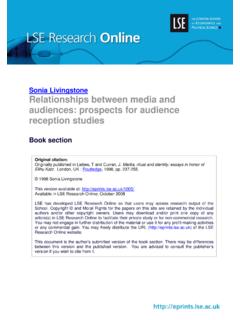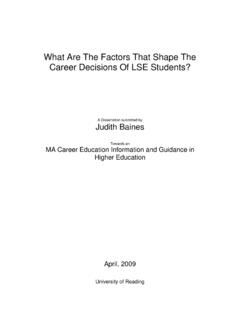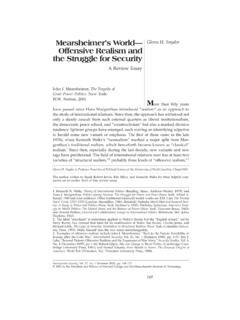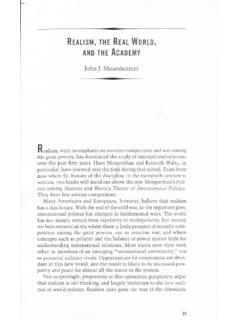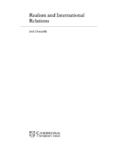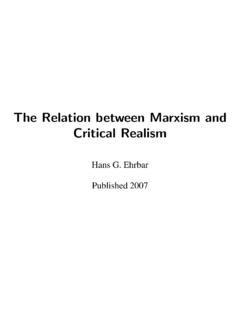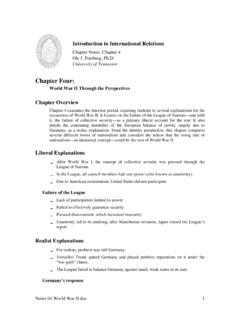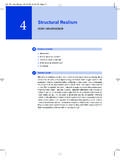Transcription of Structural realism, classical realism coversheet
1 Chris Brown Structural realism , classical realism and human nature Article (Accepted version) (Refereed) Original citation: Brown, Chris (2009) Structural realism , classical realism and human nature. international relations , 23 (2). pp. 257-270. ISSN 0047-1178 DOI: 2009 Chris Brown; published by SAGE Publications This version available at: Available in LSE Research Online: January 2011 LSE has developed LSE Research Online so that users may access research output of the School. Copyright and Moral Rights for the papers on this site are retained by the individual authors and/or other copyright owners. Users may download and/or print one copy of any article(s) in LSE Research Online to facilitate their private study or for non-commercial research.
2 You may not engage in further distribution of the material or use it for any profit-making activities or any commercial gain. You may freely distribute the URL ( ) of the LSE Research Online website. This document is the author s final manuscript accepted version of the journal article, incorporating any revisions agreed during the peer review process. Some differences between this version and the published version may remain. You are advised to consult the publisher s version if you wish to cite from it. Structural realism , classical realism and Human Nature Chris Brown Reading Waltz in Context It is, I think, generally acknowledged that Waltz s major books are modern classics there are those who claim to see no merit in Theory of international Politics and to regard its success and influence as incomprehensible, but, for the most part, this is simply a way of expressing dislike of the ideas it contains rather than a genuine judgement as to its standing in the On the other hand, there are a great many writers who argue with greater sincerity that, while classic in its own terms, Waltzian realism has parted company with classical realism .
3 Indeed the name neorealism implies discontinuity, and was coined (by Richard Ashley in The Poverty of Neorealism ) precisely to make exactly this point possibly why Waltz himself prefers the term Structural What I will argue in this chapter is that this judgement, though in good faith, is misconceived, and that Waltz s theory has clear roots in the pasts of realism . In order to make this argument, I will first backtrack somewhat; if, as I suggest is the case, nearly everyone agrees that Man, The State and War3 and Theory of international Politics are classic texts in so far as they demand that anyone involved in the field must engage with them and most also consider that they are classics in so far as they set a standard of excellence in the field then it is not unreasonable to treat them in the way that we might treat works of classical political theory, and to pose the question how are classic texts to be read ?
4 Some post-structuralists/deconstructionists answer this question by offering what is sometimes called a symptomatic reading the locution is that of Louis Althusser, though the postmodern critic Frederic Jameson is a more accessible source. In The Political Unconscious Jameson argues that interpretation always presupposes, if not a conception of the unconscious itself, then at least some mechanism of mystification or repression in terms of which it would make sense to seek a latent meaning behind a manifest one, or to rewrite the surface categories of a text in the stronger language of a more fundamental interpretive code .4 A symptomatic reading, in other words, pays attention to exclusions as opposed to surface content, and invites us to reconstruct the text to fill the gaps and silences that have been identified an example is Ashley s Living on Borderlines: Man, Post-structuralism and War which offers a symptomatic reading of Man, The State and War, bringing out the ways in which the text escapes the control of the author, at some points privileging man at others the state.
5 5 There is something to be said for this approach; exclusions and omissions clearly are important and the author cannot be allowed to exercise authority over the interpretation of a text but, still, such a reading is always open to the charge that one can make of any text whatever one wishes to. Rather than a symptomatic reading, but not wholly divorced from the idea, I would prefer to approach texts along contextualist lines that is, we must read texts in contexts; more specifically, we must treat texts as speech-acts, and ask not just what the author is saying, but also what the author is Symptoms are important here, but what this centrally involves is an attempt to recreate as far as possible the context within which the author wrote; most of all, we must not assume that an author is addressing a timeless set of problems, much less a set of problems that we happen to be concerned with.
6 This is a very difficult task, for two reasons. To illustrate the first, consider Quentin Skinner s work on Hobbes; a prodigious scholar with a command of the relevant classical and early-modern languages which has rarely been equalled, Skinner is 2probably familiar with everything that might have influenced Hobbes s work. Skinner s scholarship explicitly reflects this reading and so can claim to place Hobbes in his contemporary context by following Skinner we can, in principle, see what worried Hobbes and what he wanted to do with his texts. It is impossible to imaging this kind of depth of context being available to even the most learned and industrious commentators on modern writers we can do our best, but our best is bound to fall short of the ideal.
7 But there is a second, more intractable problem, which is perhaps best illustrated by a musical analogy. Consider the post 1945 movement towards authenticity in classical music, the attempt to recreate the conditions under which works by Bach and Beethoven were first performed the use of original or replica instruments, time signatures and notation of the period, smaller orchestras and choirs, different layouts, and, in general, original performance practice based on contemporary accounts. The result of this movement has been to change quite radically what we understand by the performance of, say, a Beethoven symphony or concerto there is a great deal more lightness and speed than in the rather ponderous versions that used to be common, period pianofortes create a much crisper sound-world, and so on; even modern symphony orchestras usually pick up some of these changes.
8 But what cannot be said is that we are hearing Beethoven s symphonies the way Beethoven s audiences would have heard them. The reason for this is quite simple we cannot wipe out the auditory experiences of two hundred years by an act of will. Musically literate modern audiences will have heard Brahms, Wagner, Bruckner, Mahler et al, and even those who do not frequent the concert hall will have picked up much of the musical language of these composers via popular music (for example, the many film scores 3written by Mahler s pupils) and this will colour the way they hear Beethoven; there is no way this influence can be eliminated. The analogy here is, I hope, clear. Theory of international Politics was published in 1979. This was before: the rapid expansion of rational-choice analysis and formal theory characteristic of much (US) IR of the last three decades; the framing of such work in terms of neorealism and liberal-institutionalism in the 1980s and more recent debates over relative versus absolute gains, offensive versus defensive realism , balancing strategies, soft-balancing and bandwagonning; the arrival also in the 1980s of the so-called Third Debate, with post-structuralist theory, Frankfurt-style Critical Theory, Feminism and Gender Studies making an entrance; the addition of Lacanian psychoanalysis to the list, and the rise of multiple varieties of constructivism in the 1990s and 2000s.
9 The recent revival of interest in classical and Augustinian realism , and the Just War tradition; the attempt to establish Carl Schmitt as a canonical figure in IR; the emergence of debates on global distributive justice and more widely the emergence of international political theory as a recognisable sub-field; and, more parochially, the establishment of the English School as a putatively distinctive approach to IR. And all this has been in the realm of theory the end of the Cold War is also worthy of note. Of course, many of these developments were stimulated by readings of Waltz s work, or developed in opposition to such readings, but the musical analogy holds post-Beethovenian musical language was, one way or another, heavily influenced by Beethoven s work but it still makes it impossible to listen to Beethoven with early nineteenth century ears.
10 Similarly, how are we, in 2008, to read Waltz s work without everything that has happened since then in the field influencing our judgements? 4 The question seems to answer itself; it simply is not possible to achieve the kind of distance that this approach to reading a text requires but we can at least make the effort, and, as it happens, I am well placed to make a shot at this task, because in 1980 I wrote a review essay on John Burton s Deviance Terrorism and War and Waltz s Theory of international Politics, which means I can at least see how I thought about things then, before all the developments listed in the previous Moreover, although about half of this essay is dedicated to Waltz, the main focus of the piece was on Burton, and my reading of Waltz was written sine ira et studio which makes it, I think, a more useful document.
